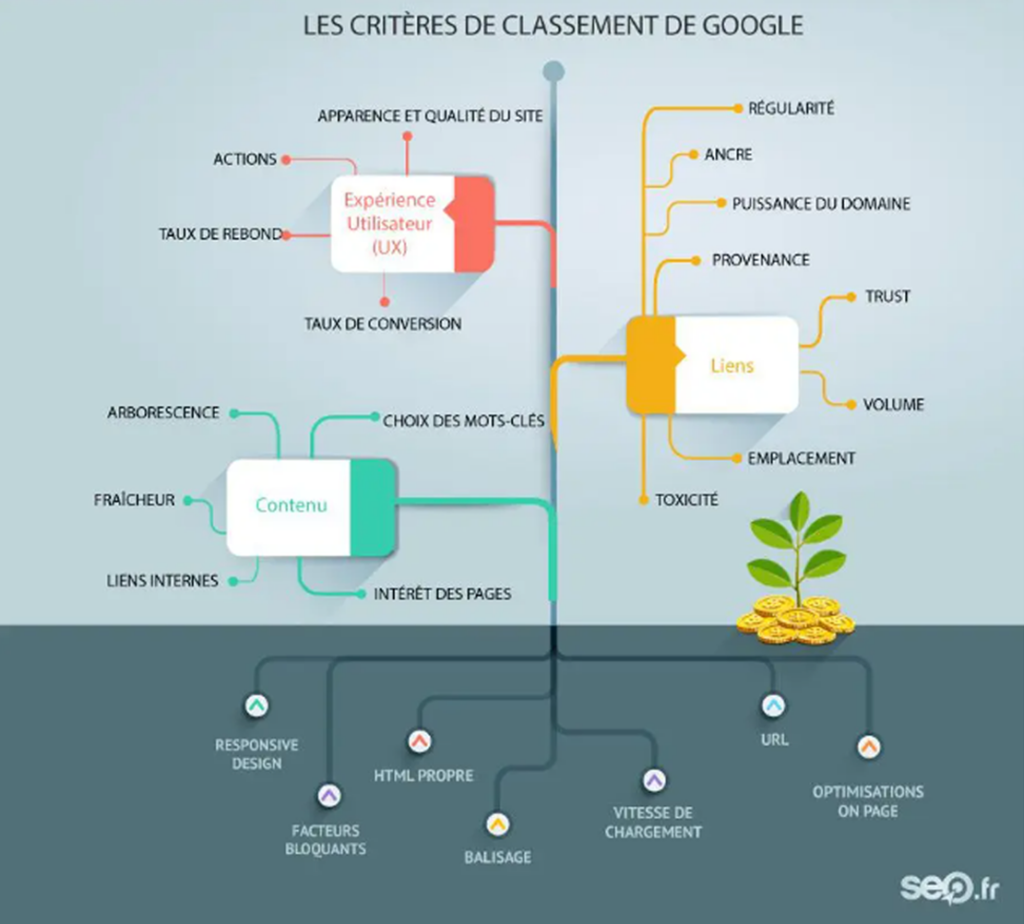What is SEO?
SEO (Search Engine Optimization) stands for “optimization for search engines”.
This term defines all the techniques used to improve a website’s position on search engine results pages (SERPs). It is also known as natural referencing. The aim of a search engine optimization expert is to improve the visibility of the websites they work on by moving them up the search engine rankings (Google, but also Yahoo!, Bing, etc.). The aim is to bring together Internet users interested in products/services or informative content.
A site is said to be well optimised or referenced if it is in the top positions of a search engine for the desired queries.
What are the main SEO criteria?
In France, and generally around the world, the sites most visited by Internet users are those that appear on the very first page of results (in the top 10). Of these top 10 results, the first 3 sites are the most visited.
According to studies, the figures for the percentage of clicks on Google search results according to their position on the SERP are as follows:
- 1st position: 33% of clicks on computers
- 2nd position: 15.6% of clicks on desktop and the same on mobile
- 3rd position: 10% of clicks on desktop and the same on mobile
The first 3 results therefore account for almost 60% of clicks on search engines. That’s why it is important of being well-placed in the natural results.
Google rates websites by degree of relevance. The higher the score, the more visible the site and the closer it gets to the 1st page. To be relevant in the eyes of the search engine, several criteria are taken into account.

On-page optimization: textual content of site pages
On-page or on-site optimization is a set of techniques designed to improve the quality of the content of a website/page. There are a number of elements that need to be perfected, starting with your keyword strategy:
- Title tag
- Meta tags (Meta description, robots, keywords)
- Semantic markup (H1-H6)
- URLs
- Page content (Body)
- Internal links
Off-page optimization: external links (link building)
On the other hand, the off-site part represents everything to do with the environment of a site, and thus the links that redirect to a page on the site. These are :
- Origin of external links (backlinks from quality sites will be more relevant to Google)
- Link anchor (which term is used to redirect to your site)
The quantity of links is also a factor, but it is far more important to focus on the quality of links than on their quantity.
Got an SEO question?
Julia can help
8 years of SEO expertise

User experience (UX)
This part is the last to have been taken into account by Google. However, for years it has been clear that this is a point that needs to be taken seriously if you want to secure a place in the top search results.
There are several important criteria for SEO:
- Site ergonomics: appearance and quality
- Bounce rate
- Conversion rate
- User path
The following elements, if well-thought-out, are likely to help you gain numerous places in the results and make you much more visible. However, it would be a serious mistake to ignore the user experience aspect. You risk being penalized by the search engines, and increasingly so, as they continue to raise their standards in this area. Don’t ignore them!
Technical elements relating to the site’s infrastructure (HTML code, domain name, crawl, etc.)
These are all elements that affect the user experience (UX). These factors are essential, particularly for reducing the bounce rate or improving a site’s conversion rate.
- Weight and page load speed (very important)
- Site appearance and quality
- Architecture and tree structure
These are essential points to address, but they are only the tip of the iceberg. Search engine optimization involves a multitude of actions and regularity. It is all these operations that will improve the image of your site for Google or a search engine. In any case, SEO takes time.
Request a free SEO audit of your site
How can you optimize your SEO in 2024?
Search engine optimization is a constantly evolving sector, requiring constant monitoring to keep abreast of the latest developments and criteria to be applied. So here are a few points that you’ll need to incorporate into your digital strategy or keep an eye on over the coming months.
Mobile first
For several years now, the number of searches on mobile devices has exceeded the number of searches on desktop devices. As a result, Google and the other search engines are adapting and giving priority to “responsive” sites in their ranking algorithms.
Switching to HTTPS
Google has already officially announced it. The hunt is on for non-HTTPS sites (especially e-commerce sites). These sites have been and will continue to be banned from the first search results. So it’s best to take the lead and migrate to HTTPS as quickly as possible.
Local referencing
More and more geolocated local results are appearing in SERPs
Voice search
“Ok Google!” This phrase shows just how far voice search has come. In terms of SEO too, practices are rapidly changing in this direction. Searches are becoming increasingly natural. The focus is less and less on keywords and more and more on semantics and questions in the form of whole sentences.
Video referencing
Social networks, streaming and live platforms… As we see every day, visual content is much more represented and has a greater impact in today’s information system. That’s why producing, optimizing and integrating videos into your content can only benefit you.
SXO
After SEO, it’s time for SXO. At least that’s the term already used by some SEO experts, who see SEO as an ageing term that will no longer be used in a few years’ time. For them, the number 1 criterion will soon be user experience (UX). Hence the term SXO (Search Experience Optimization).
SERPs: What criteria should be used in SEO?
The SERPs analyse sites using algorithms that list several hundred different criteria. These criteria vary from year to year, and the algorithms are becoming increasingly precise and sophisticated. They filter sites according to their nature and the type of query to which they respond. For example, there are filters for geolocation, images, current events, music, etc. In order to respond more effectively to these thematic criteria, SEO can also be broken down into local SEO, video SEO, image SEO, news SEO, etc.
Sites that appear naturally in the SERP results are visible thanks to their reputation, their careful work and their popularity. They are not the result of payment to Google or other SERPs, unlike paid search (SEA Search Engine Advertising). SEO is a long and tedious job, whereas SEA is quick, but temporary. With a google ads agency, you’ll get help managing your advertising campaigns. An advertising campaign made up of SEA and SEO is called SEM (Search Engine Marketing). This gives us the following equation SEO + SEA = SEM
How do you apply best practice in natural referencing?
Ideally, an SEO strategy should be incorporated into every site creation so that it can be designed directly according to SERP criteria. If this is not the case, an SEO audit is necessary to take stock of what has been put in place previously before resorting to modifications/optimizations.
SEO professionals must therefore be creative, versatile and innovative. Good ideas” and tests prior to implementing new strategies are essential if websites are to maintain their position or gain new ones in the long term.
In conclusion, mastering the tools of natural referencing requires both considerable technical and marketing knowledge. It is essential for a professional to keep abreast of developments and trends on the web so as to be able to react in the event of a change or the launch of a new algorithm.
Web merchants with large e-commerce sites have their own SEO teams, often working with the DSIN (Director of Information Systems and Digital). They can also outsource their SEO to a private SEO agency or work with specialist SEO experts. Whatever the case, the qualifications and motivations of SEOs must remain the same.









